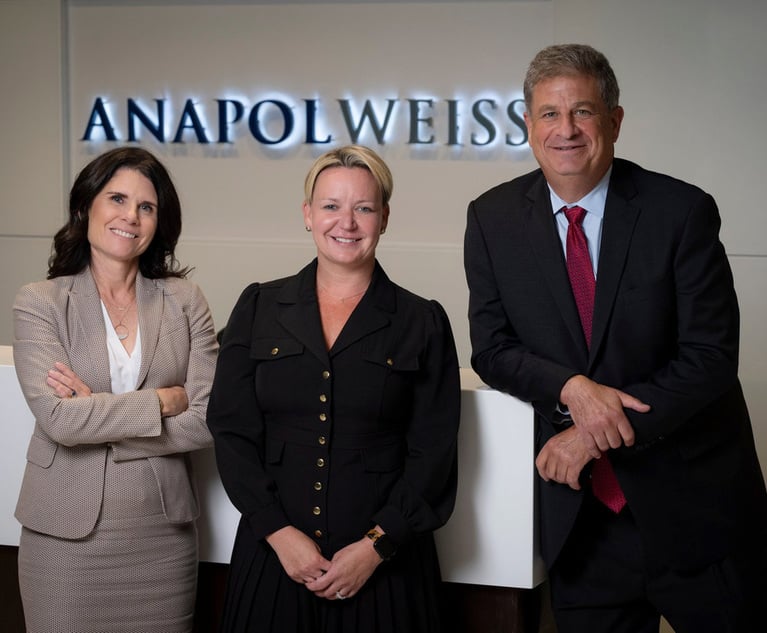Nixon Peabody Disqualification Based on Swiftly Aborted Hire Reversed on Appeal
An appellate court spared the firm from automatic disqualification after it briefly hired a lawyer who had worked on the opposite side of a dispute over workers' compensation payments.
January 26, 2018 at 06:47 PM
3 minute read

A California appellate court has reversed a decision disqualifying lawyers at Nixon Peabody from a case where the firm briefly hired a lawyer who had worked for the other side.
A trial court judge in Orange Country last year found that Andrew Selesnick, who worked at Nixon Peabody's Los Angeles office for about five weeks last year, worked for an opposing party while at a prior firm in a case Nixon Peabody was handling for California Self-Insurers' Security Fund. Despite sworn statements from members of the San Francisco-based Nixon Peabody team working on the case stating that Selesnick hadn't shared any confidential information, Orange County Superior Court Judge William Claster disqualified the firm last year, concluding that when an attorney switches sides in litigation, disqualification is mandatory and extends to the entire firm.
On Friday, the Fourth District Court of Appeal found that automatic disqualification wasn't required in this instance and sent the matter back to the trial court to determine whether confidential information was transmitted to Nixon Peabody, or if there are other compelling reasons to disqualify the firm.
“Individual assessment of the facts, rather than automatic disqualification, is a modern rule that better reflects the current realities of law firm life in the 21st century,” wrote Fourth District Justice Eileen Moore.
Moore was joined in the decision by Justices Kathleen O'Leary and Raymond Ikola.
According to the opinion, Selesnick worked at his prior firm Michelman & Robinson from about 2009 until February 2017 and served as chair of the firm's health care department. That firm has represented ActivCare Health Care Group and Mountainview Retirement Ltd. since 2014 in a lawsuit brought by Nixon Peabody's client seeking reimbursements for worker compensation claims.
According to a declaration filed by Michelman & Robinson's Jeffrey Farrow, Selesnick was actively involved in the case before he departed for Nixon Peabody in February 2017—including participating in confidential discussions about potential liability and damages. Shortly after Selesnick's move, Michelman & Robinson informed Nixon Peabody about the potential conflict issue. According to the decision, Nixon and Selesnick “part[ed] ways” around March 8, 2017.
In Friday's decision, Moore cited the Fourth District's 2010 decision in Kirk v. First American Title Insurance in finding that “whether disqualification of the entire firm is automatic is an open question” in cases where a conflicted lawyer leaves before a disqualification motion is decided.
“Automatically finding that Selesnick's very short tenure at Nixon Peabody is sufficient to impute knowledge to the entire firm, including attorneys working on the matter in a different office, places form over substance,” she wrote.
Selesnick, who is now a shareholder in the Los Angeles office of Buchalter, said he hadn't seen the decision when contacted Friday afternoon and declined to comment further.
Michelman & Robinson's Farrow didn't immediately respond to messages Friday.
Allison McClain, a spokeswoman for Nixon Peabody, said in an email that the firm was “pleased the appellate court granted our petition.”
This content has been archived. It is available through our partners, LexisNexis® and Bloomberg Law.
To view this content, please continue to their sites.
Not a Lexis Subscriber?
Subscribe Now
Not a Bloomberg Law Subscriber?
Subscribe Now
NOT FOR REPRINT
© 2024 ALM Global, LLC, All Rights Reserved. Request academic re-use from www.copyright.com. All other uses, submit a request to [email protected]. For more information visit Asset & Logo Licensing.
You Might Like
View All

Faegre Drinker Adds Three Former Federal Prosecutors From Greenberg Traurig
4 minute read
Anapol Weiss Acquires Boutique Led by Star Litigator Alexandra Walsh
5 minute read
Pierson Ferdinand Lures Veteran M&A Specialist From Sheppard Mullin in Silicon Valley
4 minute readTrending Stories
Who Got The Work
Michael G. Bongiorno, Andrew Scott Dulberg and Elizabeth E. Driscoll from Wilmer Cutler Pickering Hale and Dorr have stepped in to represent Symbotic Inc., an A.I.-enabled technology platform that focuses on increasing supply chain efficiency, and other defendants in a pending shareholder derivative lawsuit. The case, filed Oct. 2 in Massachusetts District Court by the Brown Law Firm on behalf of Stephen Austen, accuses certain officers and directors of misleading investors in regard to Symbotic's potential for margin growth by failing to disclose that the company was not equipped to timely deploy its systems or manage expenses through project delays. The case, assigned to U.S. District Judge Nathaniel M. Gorton, is 1:24-cv-12522, Austen v. Cohen et al.
Who Got The Work
Edmund Polubinski and Marie Killmond of Davis Polk & Wardwell have entered appearances for data platform software development company MongoDB and other defendants in a pending shareholder derivative lawsuit. The action, filed Oct. 7 in New York Southern District Court by the Brown Law Firm, accuses the company's directors and/or officers of falsely expressing confidence in the company’s restructuring of its sales incentive plan and downplaying the severity of decreases in its upfront commitments. The case is 1:24-cv-07594, Roy v. Ittycheria et al.
Who Got The Work
Amy O. Bruchs and Kurt F. Ellison of Michael Best & Friedrich have entered appearances for Epic Systems Corp. in a pending employment discrimination lawsuit. The suit was filed Sept. 7 in Wisconsin Western District Court by Levine Eisberner LLC and Siri & Glimstad on behalf of a project manager who claims that he was wrongfully terminated after applying for a religious exemption to the defendant's COVID-19 vaccine mandate. The case, assigned to U.S. Magistrate Judge Anita Marie Boor, is 3:24-cv-00630, Secker, Nathan v. Epic Systems Corporation.
Who Got The Work
David X. Sullivan, Thomas J. Finn and Gregory A. Hall from McCarter & English have entered appearances for Sunrun Installation Services in a pending civil rights lawsuit. The complaint was filed Sept. 4 in Connecticut District Court by attorney Robert M. Berke on behalf of former employee George Edward Steins, who was arrested and charged with employing an unregistered home improvement salesperson. The complaint alleges that had Sunrun informed the Connecticut Department of Consumer Protection that the plaintiff's employment had ended in 2017 and that he no longer held Sunrun's home improvement contractor license, he would not have been hit with charges, which were dismissed in May 2024. The case, assigned to U.S. District Judge Jeffrey A. Meyer, is 3:24-cv-01423, Steins v. Sunrun, Inc. et al.
Who Got The Work
Greenberg Traurig shareholder Joshua L. Raskin has entered an appearance for boohoo.com UK Ltd. in a pending patent infringement lawsuit. The suit, filed Sept. 3 in Texas Eastern District Court by Rozier Hardt McDonough on behalf of Alto Dynamics, asserts five patents related to an online shopping platform. The case, assigned to U.S. District Judge Rodney Gilstrap, is 2:24-cv-00719, Alto Dynamics, LLC v. boohoo.com UK Limited.
Featured Firms
Law Offices of Gary Martin Hays & Associates, P.C.
(470) 294-1674
Law Offices of Mark E. Salomone
(857) 444-6468
Smith & Hassler
(713) 739-1250






